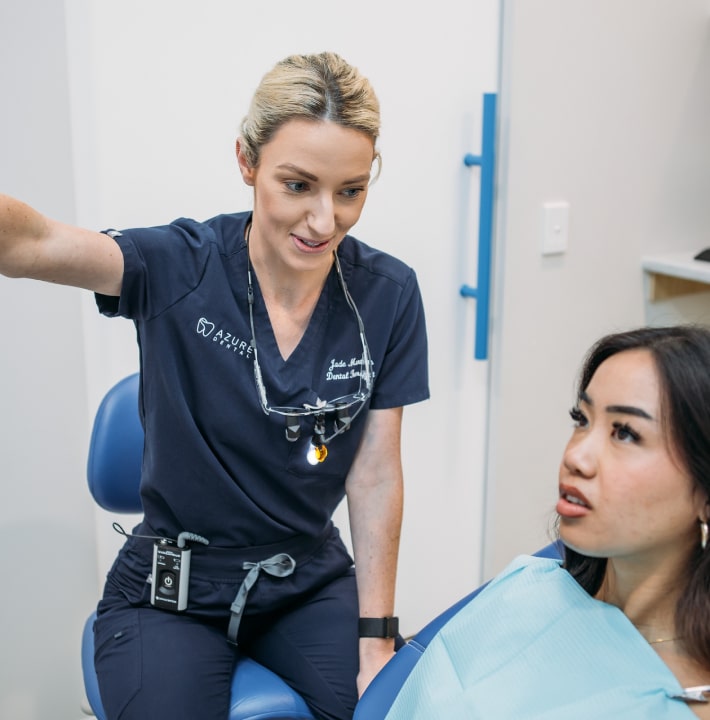Experience Efficient Wisdom Teeth Removal
For Long-Term Relief
Experience efficient wisdom teeth removal for lasting relief. Our friendly team prioritises your comfort throughout the process. Trust us for your dental care!
The Wisdom Teeth Removal Process, What to Expect at Azure Dental

A Closer Look At Wisdom Teeth Removal And Why It May Be Needed
Wisdom teeth removal is often necessary due to potential complications that can arise from their eruption. Many patients experience pain, overcrowding, or misalignment as these third molars emerge, resulting in discomfort and other dental issues.
Addressing these problems early can prevent more severe health concerns down the line. We provide a comfortable and supportive environment for wisdom teeth removal, delivering a smooth experience for our patients. Your oral health is our priority, and we are here to help!

Qualities That Define A Candidate For Wisdom Teeth Removal
Candidates for wisdom teeth removal often experience specific symptoms or conditions that indicate the need for extraction. Recognising these symptoms early can help prevent complications and support optimal oral health.
- Pain and Discomfort:
Patients may experience constant or recurring pain, tenderness, or swelling at the back of the mouth. - Crowding:
Wisdom teeth may exert pressure on adjacent teeth, causing other teeth to shift out of their normal alignment. - Impacted Teeth:
Teeth remain partially or fully trapped beneath the gums or jawbone, resulting in complications. - Recurring Infections:
Frequently occurring gum infections or the presence of cysts in the area indicate removal is necessary.
The Benefits of Wisdom Teeth Removal for Optimal Comfort and Relief
Wisdom teeth removal offers several advantages, helping to alleviate pain and prevent future oral health issues. By addressing these problematic teeth, patients can enjoy long-term comfort and improved dental health.
- Reduced Pain:
Extraction helps ease the discomfort that impacted wisdom teeth frequently cause. - Prevent Crowding:
Removing a problematic tooth prevents nearby teeth from being pushed out of alignment. - Improved Oral Hygiene:
Removing difficult-to-reach wisdom teeth makes brushing and flossing more effective, lowering the risk of decay and gum disease. - Lower Risk of Infection:
This procedure decreases the chances of developing gum infections, cysts, or other complications in the affected area.

Schedule Your Consultation Today
Experience Exceptional Dental Treatments for a Healthier, Brighter Smile

Frequently Asked Questions
Understanding the wisdom teeth removal process can help ease concerns and prepare you for the procedure. Below are common questions.
How do I know if I need my wisdom teeth removed?
If you’re wondering whether you need your wisdom teeth removed, several symptoms can indicate it might be necessary. Here’s a detailed list to help identify if wisdom teeth extraction is needed:
- Pain or Discomfort:
Pain at the back of your mouth can indicate an impacted wisdom tooth. This may present as throbbing, soreness, or pressure in your jaw. - Swelling and Gum Issues:
Swollen or red gums near erupting wisdom teeth can indicate inflammation. A gum flap may form, trapping food and bacteria, causing pericoronitis. - Jaw Stiffness or Difficulty Opening Mouth:
Erupting wisdom teeth can cause jaw stiffness, making it hard to open your mouth fully. This can impact eating and speaking comfortably. - Crowding or Misalignment of Teeth:
Lack of space for wisdom teeth can cause crowding or shifting of teeth. This can result in misalignment and an uneven bite. - Frequent Infections or Cysts:
Partially erupted wisdom teeth trap bacteria and food, causing recurrent infections. Severe cases can develop fluid-filled cysts that damage the jawbone and adjacent teeth. - Damage to Nearby Teeth:
Angled wisdom teeth may press against neighbouring molars, damaging their roots or causing decay. This pressure can also result in cavities, as these are hard-to-clean areas. - Impacted Wisdom Teeth:
Impacted wisdom teeth lack space to erupt properly, resulting in pain, cysts, or infections. They can be detected through X-rays. - Proactive Extraction:
Dentists may suggest removing wisdom teeth early to avoid future issues. Proactive extraction in the late teens or early twenties prevents the development of complications later.
If you experience one or more of these symptoms, it’s important to consult with a dentist. They can evaluate your wisdom teeth and determine whether wisdom teeth extraction is the most appropriate course of action.
What are the signs of impacted wisdom teeth?
Impacted wisdom teeth can cause symptoms that require evaluation by a dental professional. Below are the signs that can help identify if your wisdom teeth are impacted:
- Swollen or Red Gums:
The gums around the area may look red and swollen due to pressure and irritation from the impacted tooth. - Pain at the Back of the Mouth:
Pain or tenderness at the back of the mouth, especially around the wisdom tooth area, is a common sign. This pain can increase gradually and worsen while chewing or opening the mouth. - Jaw Pain and Stiffness:
Impacted wisdom teeth may cause jaw discomfort or stiffness, making it hard to open or close your mouth fully. - Swelling Around the Jaw:
Severe cases of impacted teeth can cause noticeable jaw swelling, which may impact facial symmetry. - Bad Breath or Unpleasant Taste:
Impacted teeth can trap food and bacteria, resulting in persistent bad breath in the mouth. - Gum Infections:
Impacted teeth can result in recurring gum infections, also known as pericoronitis, which cause painful swelling, discharge, and fever. - Headaches or Ear Pain:
Pain from impacted wisdom teeth can radiate, causing headaches or earaches on the same side of the head. - Difficulty in Biting or Chewing:
The misalignment caused by impacted teeth may make it challenging to bite or chew, resulting in discomfort when eating. - Shifting Teeth or Misalignment:
Impacted wisdom teeth can put pressure on adjacent teeth, gradually shifting the alignment of surrounding teeth over time.
What can I expect during a wisdom teeth removal procedure?
Patients will go through a set of steps to promote a smooth and comfortable experience during wisdom teeth removal. Here’s an overview of what generally happens:
- Initial Consultation and Assessment:
The dentist will review your dental and medical history to confirm suitability for the procedure. X-rays or 3D scans assess wisdom teeth’ position and their proximity to surrounding nerves and sinuses. The dentist will discuss sedation options, the procedure plan, and aftercare so that you are fully informed. - Preparation for the Procedure:
The area around the wisdom teeth will be thoroughly cleaned. You may be asked to wear a gown and safety glasses for protection. Local anaesthesia will be administered to numb the area. A sedative or general anaesthesia may be used for multiple teeth removal or for patients with severe dental anxiety. - Numbing and Sedation:
If local anaesthesia is used, you’ll remain awake but won’t feel pain. You may receive IV sedation to help you stay calm and relaxed. In cases requiring general anaesthesia, you’ll be asleep during the entire procedure. - The Extraction Process
- Incision & Access: A small incision in the gum tissue may be made to expose the tooth and surrounding bone.
- Handling Impacted Teeth: If the wisdom tooth is impacted, the dentist will gently remove any bone blocking the access.
- Tooth Removal: The tooth may be removed in one piece or broken into smaller segments to minimise bone removal.
- Thorough Cleaning: Once the tooth is removed, the area will be cleaned to remove the tooth fragments or debris.
- Stitches and Wound Care:
In some cases, stitches may be placed to cover the extraction site. The stitches can be either dissolvable or nondissolvable. After which, the patient will be asked to bite on a gauze to control bleeding and promote blood clot formation. - Post-Procedure Monitoring and Aftercare Guidance:
The dentist will monitor you for a short period to confirm there are no immediate complications. You’ll receive instructions on caring for the extraction site, including pain management, dietary recommendations, and what to avoid. You may need a follow-up appointment to check on healing and remove stitches if needed.
Each step of this treatment is designed to prioritise patient comfort and promote a successful wisdom teeth extraction recovery.
Is wisdom teeth removal painful?
Many patients wonder if wisdom teeth removal will be painful. Below is a breakdown of what you can expect before, during, and after the procedure to help ease any concerns:
Before the Procedure: Dentists use local anaesthetic to numb the gums and teeth so the extraction is done without pain. For complex cases, IV sedation or general anaesthesia options are offered to keep patients calm and comfortable.
During the Procedure: During tooth removal, you might experience some pressure or movement, but the anaesthesia will prevent you from feeling any pain. Patients under sedation or general anaesthesia will not be aware of the procedure until it’s complete.
After the Procedure
- Mild Discomfort and Swelling:
Mild discomfort, swelling, and tenderness are normal for the first 2-3 days after the procedure. This is managed effectively with prescribed pain medications and home care practices, such as applying ice packs to reduce swelling. - Bleeding:
Slight bleeding in the extraction area may be present for the first 24 hours. Patients are advised to avoid strenuous activities and follow the dentist’s aftercare instructions closely to prevent further bleeding.
Pain Management and Recovery
- Pain Relief Medications:
Over-the-counter pain relievers are recommended to manage any discomfort. In some cases, dentists may prescribe stronger pain medications if needed. - Home Care Tips for Comfort:
A proper diet after wisdom teeth removal plays an essential role in speeding up recovery. Avoid hard, spicy, or crunchy foods until healing is complete. Rinse gently with warm salt water after 24 hours to keep the area clean.
Overall, wisdom teeth removal is not a painful experience due to the advanced techniques and anaesthesia options available. Any discomfort felt during recovery is temporary and can be managed effectively with proper care and guidance from your dentist.
How long does it take to recover from wisdom teeth removal?
The recovery period after wisdom teeth removal varies based on the complexity of the extraction and the number of teeth removed. Generally, most people experience the following stages:
- Initial Recovery (First 24-48 Hours)
- Swelling and Bleeding:
Swelling and mild bleeding are common immediately after the procedure. Using ice packs on the outside of your cheeks can help minimise swelling. Biting down gently on gauze helps control bleeding. - Pain Management:
Discomfort is usually managed with over-the-counter pain medication. Your dentist may prescribe stronger medication for more complex extractions.
- Swelling and Bleeding:
- Early Healing (Days 3-4)
- Reduced Swelling and Pain:
By the third or fourth day, swelling should start to subside, and pain should decrease significantly. You can start reintroducing more solid foods into your diet after wisdom teeth removal. - Bruising:
Some bruising around the extraction site may appear, which is normal and should fade within a week.
- Reduced Swelling and Pain:
- Full Recovery (1-2 Weeks)
- Soft Tissue Healing:
The gum tissue around the extraction site should be mostly healed within 7-10 days. During this time, it’s essential to follow your dentist’s aftercare instructions to avoid complications like dry sockets. - Stitches Removal (if applicable):
If non-dissolvable stitches were used, you need to return to the dentist for removal.
- Soft Tissue Healing:
- Long-Term Recovery (2 Weeks and Beyond):
Although the initial healing is complete, bone and deeper tissues may take several weeks to fully recover. For impacted teeth or complex cases, this may extend to a few months.
Azure Dental offers personalised support for a smooth wisdom teeth extraction recovery tailored to each patient’s needs.
What can I eat after wisdom teeth removal?
Having a proper diet after wisdom teeth removal is important to support healing. For a few days after the procedure, consume only soft, easy-to-chew, and nutrient-rich foods that don’t require much jaw movement. Start with cool or room-temperature options like smoothies, applesauce, yoghurt, and mashed potatoes.
As healing progresses, you can gradually introduce lukewarm items like scrambled eggs, oatmeal, pasta, or well-cooked vegetables. Avoid hot, spicy, or highly acidic foods, as they can disrupt the healing process. Stay hydrated with water, but avoid straws, as the suction may dislodge the blood clot and cause complications.
Are there any risks or complications associated with wisdom teeth removal?
While wisdom teeth removal is common, it carries potential risks and complications, as with any surgical procedure. Below is the list of complications commonly associated with wisdom teeth extraction:
- Infection:
Bacterial infection occurs when bacteria enter the extraction site. Symptoms may include swelling, pain, fever, or pus discharge. Preventative measures include maintaining good oral hygiene and following post-operative care instructions to support wisdom teeth extraction recovery. - Dry Socket (Alveolar Osteitis):
Dry socket is a common complication that occurs if the blood clot dislodges from the socket, exposing bone and causing severe pain and delayed healing. To minimise this risk, avoid smoking, drinking through a straw, and vigourous mouth rinsing. - Bleeding:
Slight bleeding is normal for the first 24 hours. Prolonged or excessive bleeding may occur due to improper gauze pressure or trauma to the site. Manage bleeding by applying steady pressure to the wound with clean gauze or by using a moistened tea bag. - Nerve Injury:
In rare cases, the inferior alveolar nerve or lingual nerve can be damaged during the procedure. This may result in temporary numbness or tingling in the tongue, lips, or chin. A nerve injury usually takes 2–8 weeks or up to six months to heal. - Swelling and Bruising:
Swelling and bruising are expected after surgery and can last up to a week. Using a cold compress can help reduce swelling in the first 48 hours. Avoid physical exertion to minimise these symptoms. - Sinus Issues:
Upper wisdom teeth are near the sinuses, which may cause sinus exposure or damage. Patients may experience sinus congestion or a communication (small opening) between the mouth and sinus cavity. The condition heals naturally, but in some cases, a minor surgical procedure may be required. - Jaw Fracture:
A very rare complication, jaw fracture usually occurs with deeply impacted wisdom teeth or in patients with compromised bone strength. Careful pre-surgical assessment and imaging reduce this risk. - Prolonged Healing or Poor Wound Healing:
This occurs more commonly in smokers or patients with underlying health conditions. Symptoms include persistent discomfort and delayed tissue healing.
These risks may seem daunting. However, with the exceptional care provided by the dental team at Azure Dental, complications are usually minimised. Patients are supported throughout the recovery process after wisdom teeth extraction.
How much does it cost to have wisdom teeth removed?
Wisdom teeth removal costs vary based on case complexity, anaesthesia type, and dental clinic location. Here’s what to consider when estimating the cost:
- Complexity of the Extraction:
If the wisdom tooth has fully erupted and is aligned properly, a simple extraction is required. This procedure is usually straightforward and less invasive compared to complex extractions. Impacted teeth require surgical extraction, with prices beginning at $400 per tooth. The cost increases based on procedure complexity. - Number of Teeth Being Removed:
Removing a single wisdom tooth costs less than extracting multiple teeth at once. - Type of Anaesthesia Used:
Local anaesthesia is generally less expensive, and its cost is typically included in the overall price of the tooth extraction. However, if sedation or general anaesthesia is used, this will incur additional costs, increasing the price of the treatment. - Clinic Location:
Clinics in metropolitan areas might have higher operating costs, which can influence the price of the procedure. - Health Fund Benefits:
In some cases, health funds can cover part of the procedure cost, but it’s essential to check the specifics with your provider. - Post-Procedure Care:
Additional expenses might arise if you need follow-up visits, medications, or specific aftercare.
Understanding these factors can help you plan and budget for wisdom teeth extraction. If you’re seeking wisdom teeth removal, contact us today for a personalised quote based on your needs.